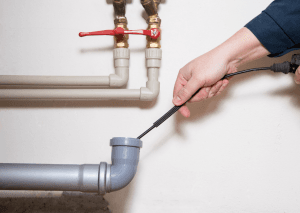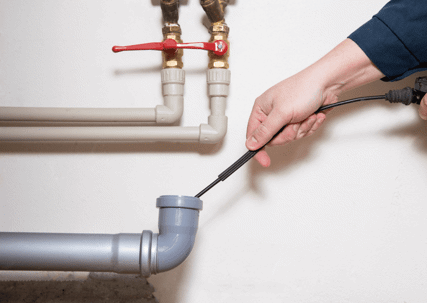Having clear plumbing lines isn’t just a convenience; it’s a necessity for the proper functioning of any home. Our plumbing system, often working behind the scenes, is subjected to a constant flow of waste, grease, hair, and other debris. Over time, this can lead to accumulation and blockages, disrupting the seamless operation we often take for granted.

Clean Out Plumbing Lines
Clearing plumbing lines ensures that water flows smoothly throughout your home. To guarantee an effective cleaning process, it’s vital to be thorough and meticulous. Here are expanded steps to ensure your plumbing lines remain clog-free:
Gather Essential Tools
Every task begins with the right tools. For cleaning plumbing lines, consider the following:
- Plunger: A must-have for every homeowner. Depending on the drain’s size, you might need a sink or toilet plunger.
- Plumber’s Snake (or Drain Auger): This is a long, flexible tool that can navigate the twists and turns of a drain to reach deep-set clogs.
- Eco-friendly Drain Cleaners: There are various products on the market that can dissolve clogs without harming your pipes or the environment.
- Protective Gloves: Cleaning drains can be a messy business. It’s wise to protect your hands from both the grime and any cleaning agents you might be using.
- Buckets & Old Towels: Essential for catching any waste or water that might emerge from a blocked drain and for cleaning up afterward.
Plunging 101
Plunging remains a tried-and-tested method for dislodging blockages:
- Ensure a Tight Seal: For a plunger to be effective, it needs to have a good seal against the drain. If plunging a sink, it’s helpful to plug the overflow hole with a rag to ensure maximum suction.
- Technique Matters: With the plunger firmly pressed against the drain, push down and pull up vigorously several times to create strong suction. This movement can displace whatever is causing the blockage.
The Plumber’s Snake Technique
If a plunger doesn’t clear the drain, a plumber’s snake might be required:
- Insertion: Push the end of the snake into the drain until you encounter resistance, which is likely the clog.
- Rotation: Turn the handle to rotate the head, allowing it to latch onto the debris causing the blockage.
- Extraction: Once latched, you can either break up the clog or pull it out, restoring free flow to the drain.
Natural Cleaning Options
Harsh chemicals can harm your pipes and the environment. A more gentle, yet effective solution is a combination of household products:
- Baking Soda & Vinegar: This dynamic duo is a popular choice for many households. Begin the process by pouring a generous cup of baking soda directly into the drain. Once that’s done, follow up with an equal amount of vinegar. You’ll witness a bubbling and fizzing reaction, which is the mixture actively working to break down organic obstructions like hair and food particles. It’s advised to let this mixture sit and work its magic for at least an hour. Once the waiting period is over, flush the drain with boiling water, which further helps in clearing out any remaining residues.
- Dish Soap and Hot Water: Grease can be a notorious culprit behind many clogged drains, especially in the kitchen. An excellent solution for tackling grease buildup is a concoction of dish soap and hot water. Pouring a few drops of dish soap, particularly those designed to fight grease, followed by a kettle of boiling water, can work wonders. The soap acts as a degreasing agent, breaking down the sticky and thick residues, while the hot water helps in melting and flushing away the grease.
Regular Flushing
Maintenance is key to preventing major blockages:
- Hot Water: Make it a habit to flush your drains with hot water weekly. This will melt away any grease or soap buildup and wash away any debris before they can form a clog.
- Salt and Hot Water: A strong salt brine can be an effective preventative treatment. Pouring it down the drain can deter grease from settling and accumulating in the pipes.
By following these steps and maintaining a regular cleaning routine, homeowners can keep their plumbing lines clear, ensuring efficient water flow and preventing potential plumbing emergencies.
Chemical vs. Natural Solutions
While commercial cleaners promise quick results, they can be corrosive, wearing down pipes over time. Natural solutions, on the other hand, are gentle yet effective, protecting both your plumbing and the environment.
Routine Maintenance: Keeping Clogs at Bay
Prevention is undeniably the best approach when it comes to maintaining your plumbing system. By being vigilant about what goes down your drains, you can significantly reduce the chances of blockages. Investing in quality strainers for sinks and showers is a small action that can yield significant results; these strainers effectively catch food particles, hair, and other debris, preventing them from causing obstructions.
Furthermore, make it a household practice to dispose of certain wastes properly. For instance, fats, oils, and grease shouldn’t be poured down the drain as they solidify and create blockages over time. Likewise, refrain from flushing items like paper towels, wipes, and feminine products down toilets.
Monthly Checks and Yearly Professional Reviews
Incorporate a monthly DIY check-up for signs of slowing drains and other issues. Annually, consider hiring a professional for a comprehensive review. This investment can prevent costly repairs down the line.
Spotting Early Warning Signs
Stay vigilant. Slow draining sinks, unusual noises, unpleasant odors, or any change in your plumbing system’s behavior can be a cry for attention. Early detection can lead to simpler, cost-effective solutions.
Reaching Out for Expert Help
There’s no shame in seeking professional assistance. Some blockages or problems may lie deep within your plumbing system or might be too stubborn for standard home remedies. In such cases, a skilled plumber can diagnose and rectify the issue with minimal fuss.
Why Expert Interventions Matter
Plumbing professionals aren’t just about fixing; they’re about foreseeing potential issues, ensuring safety, and guaranteeing their work, providing homeowners peace of mind.
Frequently Asked Questions
How often should plumbing lines be professionally inspected?
Routine inspections can help in early detection of issues and prevent potential major repairs. While homeowners can perform periodic checks, it’s advisable to have a professional inspection at least once every two years, or sooner if you notice any irregularities.
Are there any signs that suggest my plumbing lines might be deteriorating?
Yes, frequent clogs, reduced water pressure, discolored water, and an unexplained increase in water bills can indicate potential issues with your plumbing lines. It’s crucial to address these signs early to prevent more severe problems in the future.
Contact R.S. Andrews Today
While DIY methods can address minor issues, there are instances when the expertise of seasoned professionals is irreplaceable. This is where R.S. Andrews comes into the picture. With years of experience in plumbing maintenance and a commitment to excellence, our team ensures that your home’s plumbing system gets the best care possible.
So, whether you’re looking to address a specific issue, require a comprehensive check, or simply seek advice on plumbing maintenance, R.S. Andrews is at your service. Trusting in our expertise is not just about fixing immediate issues—it’s about investing in the longevity and health of your home’s plumbing infrastructure. Remember, your home deserves the best, and R.S. Andrews is here to deliver just that. Don’t wait for a minor clog to escalate into a major problem; reach out to us today!

